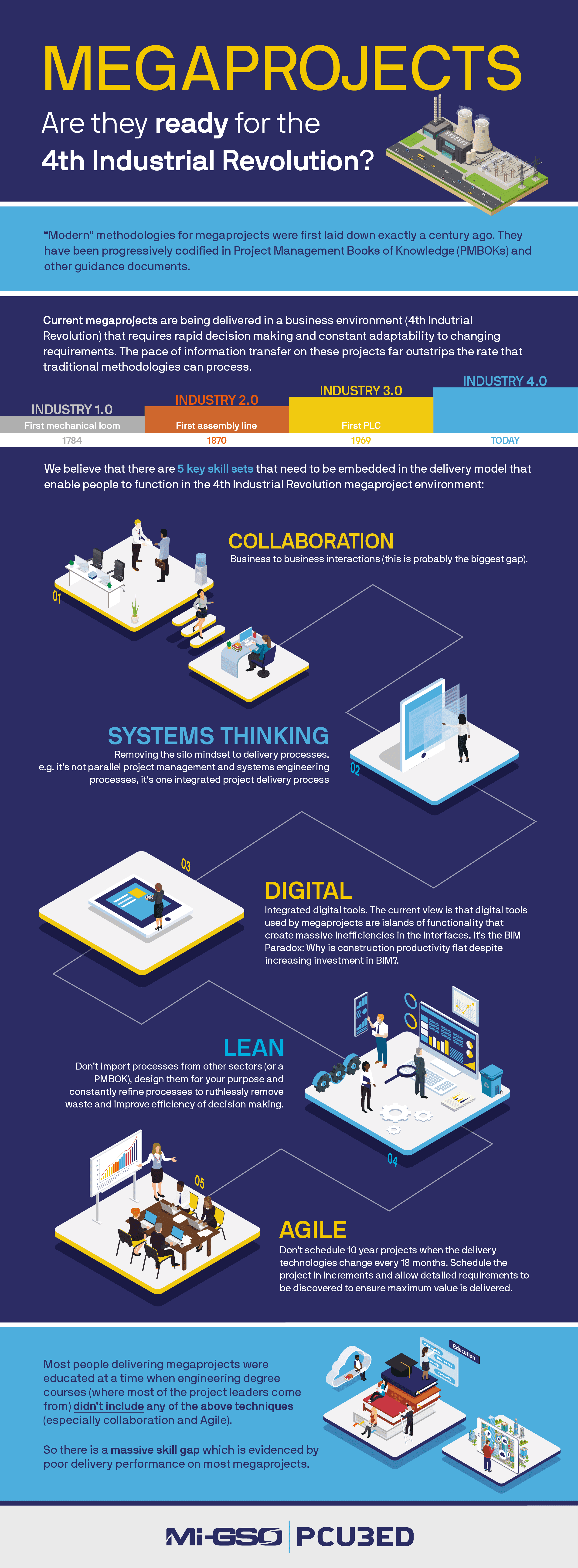Our website is not supported on this browser
The browser you are using (Internet Explorer) cannot display our content.
Please come back on a more recent browser to have the best experience possible

Complex projects and megaprojects are increasingly shaped by new enabling technologies and new demands from businesses, including how people are treated when working on these endeavours. This is often referred to as the Fourth Industrial Revolution (4IR). We examine whether project leaders and practitioners have the skills needed to take advantage of the full range of benefits the 4IR offers.
We are in the midst of a new industrial revolution. Arguably a fourth. Autonomy, robots, the Internet of Things, cloud technology and so on are transforming our daily lives and we are seeing these technologies being adopted in the project management sector.
The approaches used to deliver these new technologies are very different from the classical approach and we have seen that these new methods are being adopted in the product development and manufacturing processes in traditional engineering companies, such as aerospace and automotive.
Read Also: Megaprojects: Big Decisions

Project leaders and practitioners are not fully leveraging the opportunities unlocked by the 4IR, and project performance shows little sign of improvement despite the highly innovative and collaborative environment that the 4IR stimulates. Our paper substantiates this claim and concludes that a significant reason why these benefits are not being realised is that there is a competence gap in both the project leader and practitioner communities.
These communities are attempting to deal with twenty-first-century issues using competences, tools, and a mindset created 100 years ago. We point to three critical concepts introduced as part of the 4IR: design thinking, lean start-up, and agile at scale.
Read more: How can Innovation Frameworks help you?
These concepts when applied to megaprojects create a radically different delivery environment and instill a think big, start small, learn fast mindset which enables the project team to adapt to the constantly changing environment typical of megaprojects and the never-ending cycle of 4IR productivity improvements.
The entire project plan can no longer be fixed at the start and this needs to be replaced by a desire to deliver value incrementally over the lifetime of the project, constantly adapting to stakeholder-driven changes and opportunities presented by new enabling and functional technologies.
Such an environment requires different capabilities and we propose and justify five competences to empower the people who deliver megaprojects in the 21st Century such that they are able to deliver the planned social value to all stakeholders.
Those competences are:
The creation and development of positive business-to-business relationships is a critical competence that the project leadership must possess to release the collaborative benefits of 4IR technologies.
In a 4IR-enabled project, the project leaders and practitioners need to understand systems engineering and ensure that the project and engineering enabling systems coexist in a single concurrent process, sharing common data with no waste.
Project leaders and practitioners need to have an awareness of the architecture of the digital tools used by the entire project delivery team to the extent necessary to ensure that the solution is integrated and enables automation of the overall project delivery process.
Project leaders and practitioners need expertise in lean improvement techniques to ensure that the procedures adopted for the project are efficient and effective. This embraces all project procedures, not just project controls.
Project leaders and practitioners need to be agile trained, and leaders need to be able to develop a bespoke hybrid delivery model for the project that creates an empowered and highly motivated workforce that is able to pivot and deal with change in a rapid and effective way, to take advantage of innovation throughout the life cycle.
In a world where constant disruption is the norm, the project management community’s response has to be to seek knowledge and new skills to help it to cope and take advantage of this disruption. The five competences identified in our paper facilitate this and help ensure that megaprojects are ready for the 4IR … and any other global disruption from whatever source.
This is a summary of an article co-written by our Head of Energy, David Whitmore, working in collaboration with UCL (Eleni Papadonikolaki, Ilias Krystallis) and Leeds (Giorgio Locatelli) universities. The full article is published in the Institute of Civil Engineers Management, Procurement and Law Journal.
If you are a subscriber to the ICE journal, you can read the full article here.
Loved what you just read?
Let's stay in touch.
No spam, only great things to read in our newsletter.
We combine our expertise with a fine knowledge of the industry to deliver high-value project management services.
MIGSO-PCUBED is part of the ALTEN group.
Find us around the world
Australia – Canada – France – Germany – Italy – Mexico – The Netherlands – Portugal – Romania – South East Asia – Spain – Switzerland – United Kingdom – United States
© 2024 MIGSO-PCUBED. All rights reserved | Legal information | Privacy Policy | Cookie Settings | Intranet
Perfect jobs also result from great environments : the team, its culture and energy.
So tell us more about you : who you are, your project, your ambitions,
and let’s find your next step together.
Dear candidates, please note that you will only be contacted via email from the following domain: migso-pcubed.com. Please remain vigilant and ensure that you interact exclusively with our official websites. The MIGSO-PCUBED Team
Choose your language
Our website is not supported on this browser
The browser you are using (Internet Explorer) cannot display our content.
Please come back on a more recent browser to have the best experience possible
